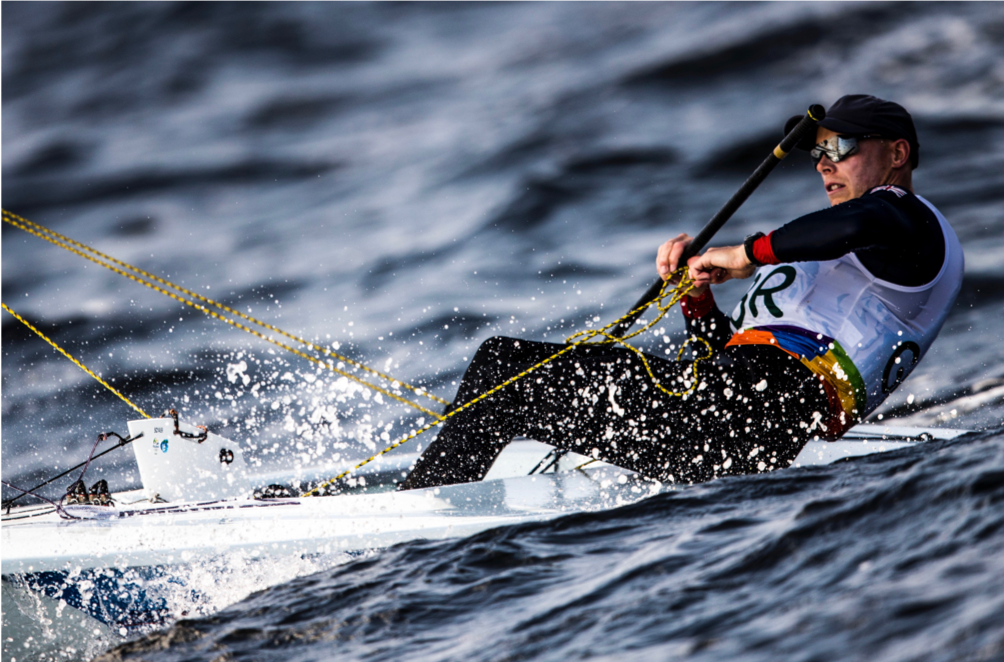
Train with Nick Thompson in Vilamoura, Portugal for the ISA Master’s Laser Sailing Clinic
Training for a master’s event? Hoping to improve your scores over your last event? Nick Thompson shares his laser sailing tips on how to develop a winning approach to the master’s sailing. As a Laser World Champion and Olympian with 6 years of coaching experience at the highest levels of sailing, including master’s sailing, Nick knows how to help master’s sailors succeed.
Here are Nick’s top master’s laser sailing tips.
Master’s sailors don’t have as much time to apply to their craft as Olympic sailors, and Nick’s coaching approach takes that into account. If you know that you only have, for example, 50 days a year that you can sail, Nick suggests using that as a starting point to figure out what the biggest gains are that you can make at that time.
This is different for everyone, Nick says. “Every sailor is different and every skill set that they bring to the table is different.” And don’t get too caught up with advanced technical skills, he says. The biggest gains for you are personal. For example, he says, “I might gain two boats by having a slightly better tack, but if we focus in on my line awareness, that might be 40 boats. It's very easy to get too caught up in the skills of sailing a laser and actually it's a game of chess. It's more about positioning and awareness of the fleet.”
Olympic athletes obsess about their performance during a campaign. “But,” Nick says,
“you can do that at any level. It's about finding those things, those little gains that you can work on and doing them in the time that you have.”
You don’t have to be mounting a 4-year Olympic campaign to pull a performance focus into your daily life. Even if you only have 50 days a year that you can sail as a master’s sailor, Nick says, “I bet you have an hour each evening where you could apply yourself to something else, whether that's watching races online, fitness training, making sure your ropes are top-notch. Whatever it is, there's always something that you can be doing something to make yourself better.”
Having a fitness plan will complement your work on the water and Nick suggests, “don't be daunted. You’ve got the time and it really doesn't take much. If you could apply 30 minutes a day to fitness training for sailing, you're going to make huge jumps.”
Apart from his laser sailing tips, when he’s coaching laser sailing clinics he helps sailors figure out a weekly, monthly or annual plan based on the time they have available and then builds a fitness plan into that.
He also suggests varying your fitness plan based on the time of year. The early season should be focused on endurance training, building up a strong base in aerobic fitness and core. But, he notes, the plan should be built for you. “It should be specific to the individual, but also specific to the time of year and what they're focusing on.”
Success, Nick says, is tied to your ability to keep your emotions steady during a competition. He encourages sailors to avoid emotional “spiking and dropping” that leads to irrational decisions on the course.
Learning how to stay balanced emotionally gives you an edge over the competition because Nick suggests, this is a skill most other sailors don’t have. “I've done a lot of World championships now and generally I tend to do better at World championships. It's not necessarily that I'm raising my game a huge amount, it's that everyone else around me starts to fall off a little bit through the event.”
Competing in a major event doesn’t require anything special to win. Nick suggests that focusing on doing the basic things in sailing well will see you through.
Focus on the race and let the expectations fade away, he suggests.
“You've got to remember it is just a sailing race. It doesn't matter whether it's the World's, or your weekend club race. It's the same thing."
"You're trying to read the wind conditions and position your boat the best you can around that racetrack using the best skills that you've got. And that's it. There isn't really much more to it. The fact that it's the Olympic games or whatever it is, is kind of irrelevant.”
Having a plan on the course helps you to focus on what needs to be done and ignore the stuff that’s not important. “You've got to have a plan,” Nick says. “Whether that plan is right or wrong, you've got to execute something well, whether that's just getting off at the biased end of the line, or the best start possible with the lane. And then figuring out the rest as it comes. You've got to have some idea of what you want to do.”
Evaluating how your plan is working in real-time and adapting is also critical for success. “The best sailors are those that are able to adapt; that learn the quickest. Every moment of a race is slightly different. It’s about adapting to that and learning the fastest.”
Nick will be bringing his experience as a world-class laser sailor and coach to Vilamoura, Portugal in November as a guest coach for the International Sailing Academy Laser Master’s Clinic. Learn more and register.